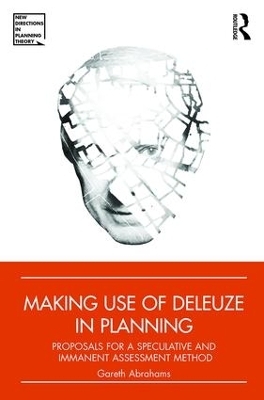
Making Use of Deleuze in Planning
Routledge (Verlag)
978-1-4724-7757-6 (ISBN)
Making Use of Deleuze in Planning translates and re-creates some of Gilles Deleuze’s most abstract philosophical concepts to form a new, practicable planning assessment tool. It shows what his philosophy can do for planning theory as well as planning assessment practice and, in doing so, sets out a pragmatic approach to Deleuzian studies: one that helps form bridges between ontological problems and the problems found in professional practice. It also breaks new ground in assessment methodology by challenging the essentialist ideas underpinning assessment methods like BREEAM and setting out and testing a new form of non-essentialist assessment named SIAM. The book argues that Deleuze’s philosophy can be made useful to planning as long as one is prepared to adapt and re-create his key ontological concepts to respond to the specific demands of the field.
Gareth Abrahams crosses an invisible line between theory and practice. He is a Deleuzian theorist whose publications push the boundaries of Deleuzian scholarship and spatial theory. He is also a practising, chartered architect who has designed and delivered a range of complex buildings across the UK from specialist schools to large office developments and from bespoke new-build schemes to highly sensitive heritage refurbishments.
Introduction Part 1: Assessments, Essentialism and Deleuze 1. A Problem with Assessments 2. Essentialist and Non-essentialist Assessments Part 2: How to Make Deleuze Useful 3. Attempts to Make Deleuze Useful Part 3: A Case Study of BRE Assessments 4. A Research Strategy 5. Methodology for Research Stage A 6. Theoretical Experiments: Research Stage A 7. Methodology for Stage B 8. Empirical Experiments: Research Stage B Part 4: Synthesis, Discussion and Conclusions 9. Synthesis and Discussion 10. Conclusions
| Erscheinungsdatum | 11.01.2017 |
|---|---|
| Reihe/Serie | New Directions in Planning Theory |
| Zusatzinfo | 10 Tables, black and white; 8 Line drawings, black and white; 1 Halftones, black and white |
| Verlagsort | London |
| Sprache | englisch |
| Maße | 156 x 234 mm |
| Gewicht | 453 g |
| Themenwelt | Geisteswissenschaften ► Philosophie |
| Naturwissenschaften ► Biologie ► Ökologie / Naturschutz | |
| Naturwissenschaften ► Geowissenschaften ► Geografie / Kartografie | |
| Sozialwissenschaften ► Soziologie | |
| Technik ► Architektur | |
| ISBN-10 | 1-4724-7757-X / 147247757X |
| ISBN-13 | 978-1-4724-7757-6 / 9781472477576 |
| Zustand | Neuware |
| Haben Sie eine Frage zum Produkt? |
aus dem Bereich


